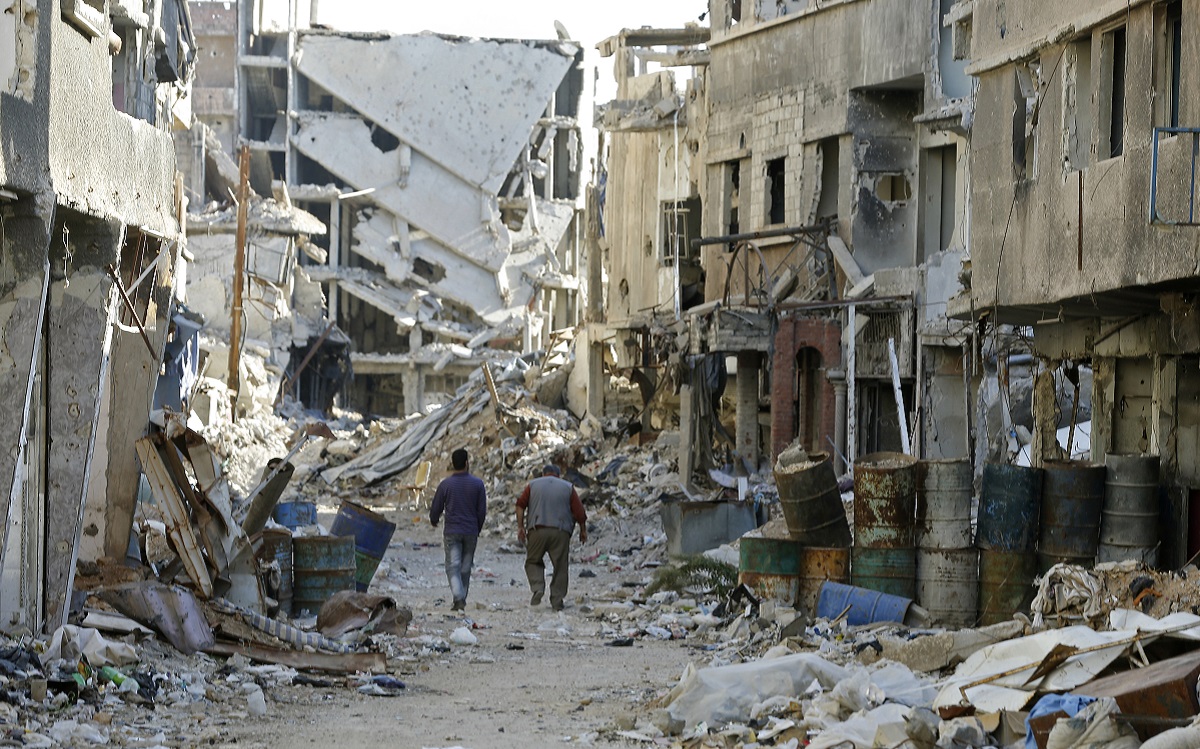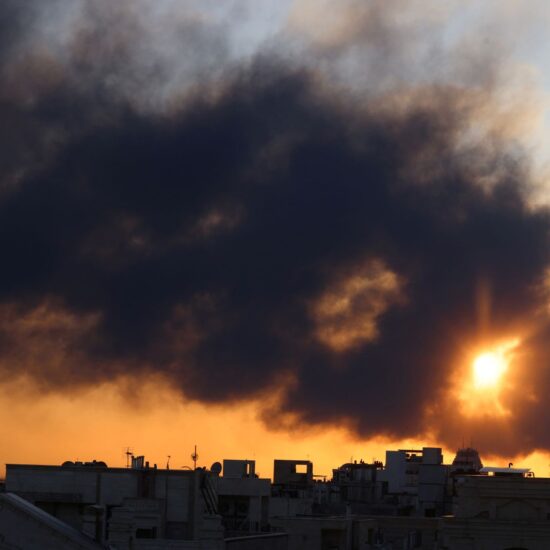
On April 26, the Guardian released a report that revealed a brutal massacre that occurred in the Damascus suburb of Tadamon nine years ago. The following day, the researchers who had investigated the massacre released their own report for New Lines Magazine.
As part of the report, they released a video that had been clandestinely taken from a computer belonging to one of Syria’s intelligence agencies. It showed Amjad Youssef, a military intelligence warrant officer, shooting bound and blindfolded men and kicking them into a large pit. After the killings, their bodies were burned. The researchers determined that at least 41 people were killed in the massacre.
What is striking about the Tadamon massacre, unlike the hundreds that have occured in Syria since the beginning of the revolution in 2011, is that the perpetrators were clearly identified and admitted their guilt. Additionally, the researchers managed to establish that there was a direct line between Amjad Youssef and Bashar al-Assad, Syria’s now long-time ruler.
Though the investigation into this massacre is a crucial step in uncovering the many crimes committed in Syria over the last 11 years, evidence is, unfortunately, not the deciding factor in prosecuting war crimes.
Indeed, the amount of evidence that implicates government officials and core members of the Assad regime is gargantuan, and some, such as the Middle East Institute’s Charles Lister, have pointed out that there is more evidence of Assad’s crimes in Syria than there was against Hitler in Germany.
However, the crucial distinction is that the Third Reich collapsed and was overthrown, while Bashar al-Assad is still very much in power. On top of that, the government, although the primary perpetrator of the most and worst crimes, is not the only guilty party. Armed opposition groups, the Islamic State (IS), and Kurdish-led forces have all committed atrocities that must be accounted for.
There can be no social reconciliation unless all crimes are equally evaluated following the eventual demise of the Assad regime.
Predatory states and their eventual demise
A staple of the Arab Spring uprisings that engulfed the Middle East in 2011 was the slogan, ash-sha’ab yureed isqaat an-nitham, meaning the people want the fall of the regime. And, at least in my opinion, as well as many others’, the Assad regime’s fall is inevitable and has been since 2011.
Indeed, there can be no accountability, justice, or reconciliation until all foreign forces withdraw from Syria and the Assad family’s grip on power comes to an end.
There are a variety of ways that political scientists categorize and analyze states, governments, and their respective regime-types. Though Syria can be defined as a rigged-election autocracy dominated by a military apparatus, there is a crucial difference between the Syrian state and other autocratic systems: namely, the relative instability of how the regime maintains power.
To illuminate this point, one must see Syria’s current system as being analogous to the Democratic Republic of Congo, at the time known as Zaire, under Mobutu Sese Seko, as opposed to North Korea under the Kim family, for instance. Whereas the Kim family have managed to create a relatively stable system that can likely avoid total collapse in the long-term for a variety of reasons, the Congo under Mobutu violently collapsed in the late 1990s after decades of institutional decay.
Mobutu’s Congo is generally seen by political scientists as a textbook example of a predatory state, or one in which a country’s political elite view the state as the primary source for their personal enrichment while not expending any resources to maintain the state itself. In practice, a predatory elite gorge themselves via state institutions leading to the continual decay of those institutions and the state itself.
In the case of the Congo and Syria, the regime’s survival is dependent on predatory practices that inevitably weaken the state in the long-term. In Syria, this process is mainly carried out by the state’s security apparatus, which functions like a parasite on the population and the state’s institutions.
Though it tends to be overlooked, the Lebanese border was perhaps the most crucial front in the war, and if Hezbollah had not intervened to help government forces clear the border areas, the link between Damascus and the Alawite heartlands of Latakia and Tartous could have been cut, putting the government in a losing position.
Of course, most states, both democratic and nondemocratic, can engage in predatory practices, but the crucial aspect for the state’s survival as a coherent entity is a balance between predatory action and the state’s functionality.
It is essential for a regime’s viability and survival that the political elite do not over indulge themselves and inadvertently transform the state into some sort of zombie with hollowed out and essentially non-functioning institutions.
An illuminating example of the Syrian state’s predatory practices is the hundreds, if not thousands, of checkpoints scattered across the country. The government simply does not have the necessary resources to directly fund or maintain its entire security apparatus, so instead of actually providing adequate salaries to its soldiers and militias, it provides security privileges.
These privileges include increased freedom of movement, a closer relationship with illicit capital flows, and, most importantly, the freedom to loot and collect bribes at checkpoints.
As the state cannot provide the necessary resources for its foot soldiers to make a decent living, it allows them to directly collect “taxes” from the population. Though this practice stabilizes the security apparatus in the short-term, it inevitably bleeds an already impoverished population dry.
The government’s survival via foreign intervention
The other key similarity between Mobutu’s Congo and Assad’s Syria is the role of foreign powers in propping up their respective regimes. In the Congo, it was largely the West, primarily the United States, that put Mobutu in power and assisted him in maintaining his rule.
After the end of the Cold War, the US no longer needed to vigorously support Mobutu, who was viewed as an important bulwark against Communism in Central Africa and a crucial supplier of natural resources. This shift caused his regime to slowly disintegrate, and eventually be overthrown by a joint Rwandan and Ugandan invasion in the First Congo War that was, in fact, greenlighted by the Clinton administration.
Syria is in a similar position, as the regime’s continued survival is almost completely dependent on Russian and Iranian support. If Iran, and subsequently Russia, had not directly intervened in Syria, there is little doubt that the rebels would have managed to capture Damascus and overthrow Assad’s government, possibly as early as 2013.
During those first two years of the war, Iranian support, especially Lebanese Hezbollah’s entry into the conflict, as well as other Iranian-backed Shiite militias’ involvement, was absolutely critical in preventing the regime’s downfall.
Indeed, there can be no accountability, justice, or reconciliation until all foreign forces withdraw from Syria and the Assad family’s grip on power comes to an end.
Though it tends to be overlooked, the Lebanese border was perhaps the most crucial front in the war, and if Hezbollah had not intervened to help government forces clear the border areas, the link between Damascus and the Alawite heartlands of Latakia and Tartous could have been cut, putting the government in a losing position.
From this perspective, it was Iran and Hezbollah that ultimately saved the Assad regime in the first few years of the conflict, but it was Russia’s intervention that enabled the government to actually “win” the war.
Up until Russia’s direct intervention in 2015, the government had continually lost ground, only holding its most crucial positions in western Syria, such as Damascus, Homs, the coastal Alawite heartlands, and parts of Aleppo. That year, the government suffered major defeats, losing Idlib to the jihadist-led Army of Conquest in the north, Palmyra and the Syrian desert to IS, and the Nassib Border Crossing with Jordan to the Southern Front.
Russia’s intervention fundamentally changed the war, and the opposition, outside of a few minor operations, has not seen a meaningful military victory since then.
Even though the government has strengthened its grip over its territory in western Syria in the past few years, it is still largely dependent on these foreign forces to survive. Without their support, it is quite certain that the government and its security apparatus would collapse, as they have completely eaten Syria’s institutions and turned the country into a dead man walking.
Prosecuting war crimes now and in the future
As has been made clear, investigating and prosecuting war crimes committed in Syria over the last 11 years would require a massive shift in the foreign policies of Russia, Iran, Turkey, and the US, as well as the overall demise of the Assad regime.
I wrote an article last month regarding war crimes in Ukraine, looking at the cases of Yugolsavia, Syria, and Lebanon for guidance on how to investigate and prosecute such atrocities. I will not rehash the arguments I made in that article, but it is crucial to apply the lessons I explored throughout the piece.
One of the key points I made was that when prosecuting large-scale atrocities like those committed in Syria, it is necessary for an international body to be formed to seek accountability and justice.
As of now, there have been successful cases against perpetrators of war crimes in Syria, but these litigations have been undertaken by individual countries and not by an international body like the International Criminal Court (ICC) in the Hague.
As I indicated in last month’s article, Anwar Raslan, a former colonel in the government’s security services, was sentenced to life in prison in Germany for murder, rape, and crimes against humanity. Additionally, a pro-government “doctor” who tortured prisoners in Homs also stood trial in Germany for human rights abuses.
When prosecuting large-scale atrocities like those committed in Syria, it is necessary for an international body to be formed to seek accountability and justice.
IS members have stood trial in the US as well, such as El Shafee Elsheik and Alexanda Kotey, two ex-British nationals who participated in the brutal murder of James Foley, among others.
Unfortunately, these cases are merely a drop in the bucket, as there are likely hundreds of individuals who need to be held accountable for their actions during the war in Syria.
Regarding the Tadamon massacre, one must wonder what the actual recourse for the crime can be. Amjad Youssef is still in Syria, and he is thus protected by the government and Russia by default. Though he will likely never be able to set foot in a Western country, he still enjoys freedom in Syria, especially as a member of the security apparatus.
However, the report did lead to some interesting, yet still tragic, consequences within Syria. As the massacre is simply impossible to deny and Youssef essentially admitted to the researchers that it was him in the video, the government has been forced to tacitly acknowledge that it occurred.
The government announced that it would release and give amnesty to hundreds of detainees who had been held in detention facilities on alleged terrorism charges. Massive crowds emerged in central Damascus awaiting the release of the detainees, with many hoping they would be able to reunite with family members, or at the very least learn some new information about their well-being.
Some have said, including supporters of the government, that this move was a response to the recent revelations regarding the Tadamon massacre, but this may not be the case, as others have pointed out that the government has regularly released detainees during Eid.
Indeed, there have also been several large amnesties since the beginning of the revolution, but activists have indicated that this most recent release is the most comprehensive in relation to terrorism charges.
Either way, such amnesties serve two main functions. Firstly, amnesties serve as a form of propaganda, as the government can portray itself as being compassionate toward the families of those who have been detained in Syria’s infamous detention facilities. The second and more insidious function is to remind Syrians that state violence can be completely arbitrary and the government holds their lives in its hands.
Regarding amnesties more broadly, it is not a feasible solution in resolving the many atrocities committed during the war. Besides the fact that the government has already shown that reconciliation agreements do not ensure safety for former members of the opposition, a blanket amnesty for war crimes committed in Syria, such as what was done in Lebanon following its civil war, would simply not heal the terrible wounds left created during the conflict.
Many of Lebanon’s current woes and political divisions are byproducts of the agreement that ended its civil war in 1990, and in Syria these effects would be even worse. Blanket amnesties exchange justice for peace, and they should generally only be applied when all sides in the conflict committed relatively equal levels of atrocities.
Though amnesties can incentivize warring parties to put down their weapons, they rob the population of closure, and, quite frankly, Syria cannot return to being a coherent society without meaningful reconciliation and justice.
The war in Syria has been one of the most deadly and brutal conflicts of the 21st century, and it will take generations for the country to rebuild. The Assad regime is not viable in the long-term, and it will one day fall, but until then, Syrians will be forced to wait in an excruciating limbo.
David Isaly is a journalist and researcher with @NOW_leb. He tweets @DEyesalli.








